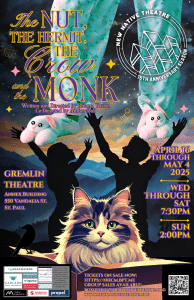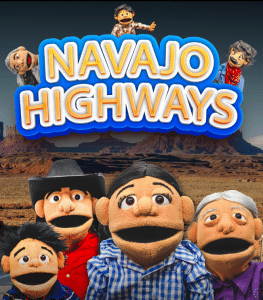Anticipating the exciting release of the new and quite literal chilling Indigenous thriller “Cold Road,” we were fortunate to sit down with the amazingly talented star, Roseanne Supernault. Continue reading for the full interview.
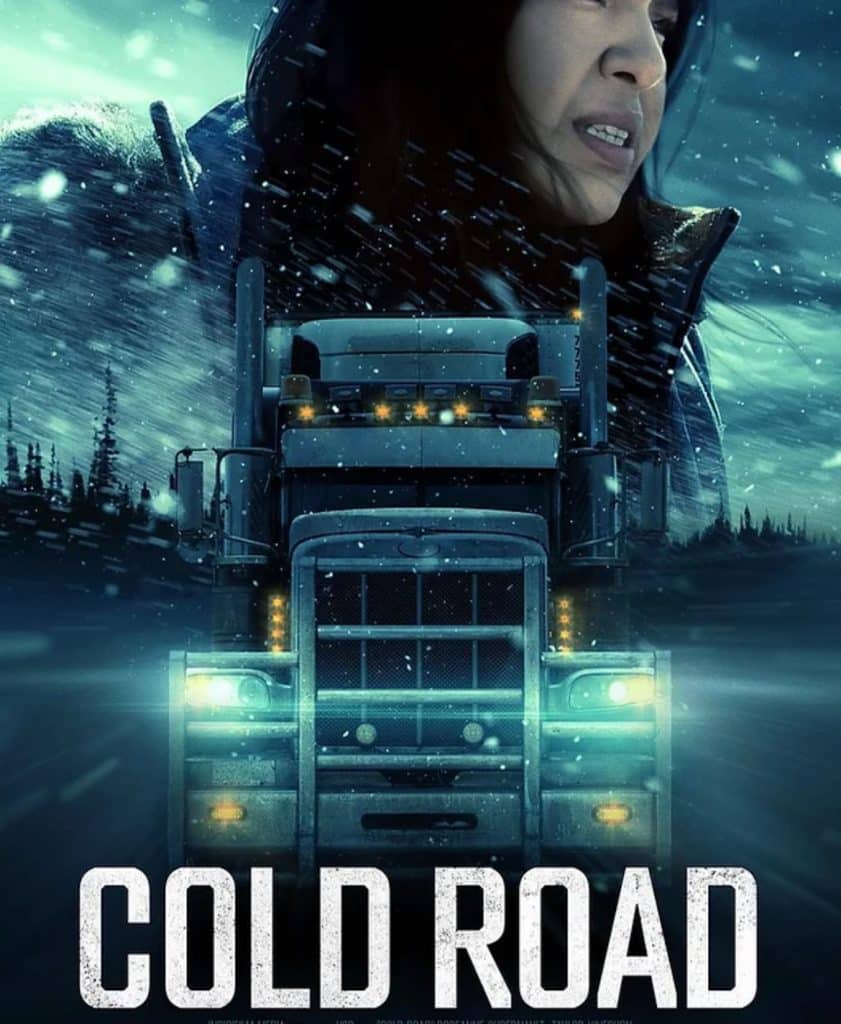
Kelly: How did you come into this role? What was your initial reaction to learning about your character, Tracy?
Roseanne: “I was fortunate enough to audition for the role of Tracy, and then I went through a callback process. I’ll never forget the day they offered me the lead role… They said they would give me one hour to mull it over, as I had to be on a flight right away to head up north to begin filming. I looked out my window, and the wind was whipping and howling and it was particularly cold that winter day… I saw it as a sign of what I was about to walk into, should I choose to… and I was not wrong. I ultimately decided to take the role, knowing it could be dangerous, and it was by far the coldest condition I have ever filmed in. But I believed in Kelvin, and I felt the subject matter of this film to be of the utmost importance, so I said yes.”
Kelly: Were there any nerves while working on such a thrilling film? If so, what were they like? If not, what helped you keep your composure while playing a character who was going through so much turmoil and fear?
Roseanne: “I had some nerves about stepping into a lead role again, I had taken a step back for a few years to focus on motherhood. I adopted my nephew almost six years ago now, and it was a grueling custody battle, but we got through it together. It was a bumpy road, so I wanted to give him several years of me being Mommy 100%. He gets really excited when he sees me on TV. So he’s proud of me, and he’s very understanding of when I have to go to work (and he’s especially happy with the video games he gets when I come back!)
So, suffice it to say, this was a different journey because it was the first time that I led a film while being a mom, especially when you’re filming at -35 Celsius, where the wind chill can feel like -40 Celcius. They shut down the set at -40 because the film equipment won’t work at that point. One thing I will say, as someone who grew up in the north and with our illustrious leader Kelvin who grew up even farther north than me, I was seriously impressed with how well our southern Canadian crew handled the conditions. We were often like penguins huddled together in between shots. We kept one another warm. I was lucky to have an awesome driver who went above and beyond to provide for me (lots of hot teas and hot chocolates!), and he always had that van warmed up for me. It makes me emotional just thinking of how darn proud I am of this team. We overcame so much together.
In terms of my personal journey of overcoming the intense emotions of the turmoil my character Tracy was facing, I used the cold. I used the awful conditions. The stress you see my character going through on screen, in a lot of ways, is tied to the stress I was feeling from being in the cold. Composure was me just conserving the heat in my body to use in the next scene; in a way, it was a good acting exercise because, in theatre, they tell you to imagine your dressing room was on fire, but I was fighting against literal death by freezing so I didn’t have to do that during this performance!”
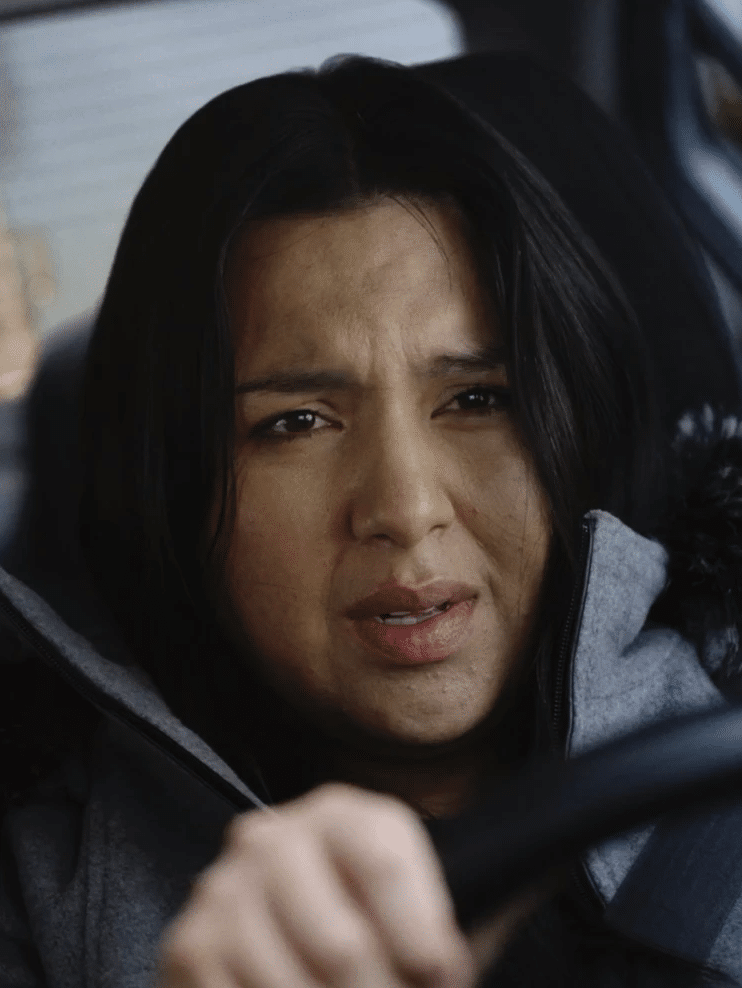
Kelly: How do you and Tracy relate to each other? How do you differ?
Roseanne: “The way I relate to Tracy in some ways is her kindness at the beginning of the film. She’s so nice it’s sickening, and in a lot of ways, I could relate to that. I went on a similar journey in my own life, the way Tracy does in this film, where she goes from being a doormat to being a fighter. Someone who has to dig deep inside themselves and find an animal within who is fearless in the face of death or violence. Unfortunately, I can relate on so many levels. And my heart aches for other Indigenous women like me in this country who have had to put on brave faces and deal with monsters they shouldn’t have to. I am so proud of Tracy and of her journey. I was elated to find that some femme viewers of the in-progress screening and of the world premiere screening said they felt cared for while watching the film… despite the fact that many will be white-knuckling their seats during the film – it is a wild ride – but ultimately there is great care for women in this film. I mean, people leaped out of their seats, and people were hollering at the screen during the world premiere. This film has a way of making people come alive; it’s incredible.
The difference between Tracy and I… Well, I’ve actually been in a somewhat similar situation as Tracy on the highway, and I got real angry real fast. I didn’t give the bad guy the benefit of the doubt like Tracy does. Some prick in a semi thought it would be funny to tailgate me mere feet behind my SUV. I was driving in northern Alberta at the time. This guy was literally just a couple of feet behind us, I recorded the whole thing. My son was with me and I transformed into this mama bear real fast. I honked my horn and started swearing at the driver, I used a lot of ‘f’ bombs, and I made the meanest mug I could (like my aunties and sister taught me). Sometimes you just gotta let people know they’re barking up the wrong tree. The truck driver I was dealing with figured that out quickly cause he sped off and didn’t bother us again.”
Kelly: This film may touch on the anxiety that a lot of Indigenous women feel about their lack of protection, especially relating to the tragic events along the Highway of Tears. What is something you want viewers to take from this movie regarding the lack of safety Indigenous women experience?
Roseanne: “I don’t know what Kelvin was channeling when he wrote this film, but he hit the nail on the head. I know women who have been in similar situations on the highway against nefarious people… Their tales are chilling and, in my opinion, are reflected in this film.
I mean, when we set out to make this film, our focus was on making a cinematic film with pulpy 70s and 80s vibes reminiscent of a vintage thriller, if you will. But naturally, with this subject matter, people are going to feel a lot of feelings about it. Whether people like it or not, this tale is more truth than fiction.
I hope if you’re out on a highway one day and you see an Indigenous woman in distress, believe her and protect her. I’ve seen the good in people, and I think we just have to put our damn phones down and pay attention to one another.
Also, for women in general, but specifically for Indigenous women… I would never suggest any human being carry a weapon around, but if you’re going down a cold, isolated highway or on a long journey driving alone, I don’t think it’s illegal to be in possession of an axe in the trunk of your car. Maybe you like camping, and you never know when you’ll need it to chop wood. I think you can take some notes from Tracy when you watch the film.
I say this because in my opinion, as Indigenous women, we have to be strong enough to take care of ourselves. I’ve learned the hard way that no one is coming to save me. The reality is that people will watch this film and will care about us for a few months or a year, but then it’s back to us handling our business, as usual.”

Kelly: What feelings do you hope to invoke from Indigenous people? What feelings are you hoping to invoke in non-Indigenous viewers?
Roseanne: “I’ve been a lot more selective in terms of what projects I jump onto these days, and at the time they were casting this film, I was saying no to some gorgeous projects being made by some incredible people because I can’t handle talking about residential school anymore, or anything to do with the scoop. I physically couldn’t do it on time. Every time I worked on the scenes I was sent as an actress, I felt sick, so I had to politely decline those projects. And the only reason for that was I couldn’t handle the subject matter, and I think a lot of our people are getting to a place where we’re having a difficult time watching those stories. I commend anyone who can make those projects, and by God, don’t stop making them because non-Indigenous people need to understand the atrocities that we survived or didn’t survive…
That being said, in terms of Cold Road, I was so happy to see people leap out of their seats and cry out at the screen. Like, I cannot tell you how fulfilling that was. I don’t want to give anything away but see for yourself in the film.
I want to keep making films like this and shows like this, where people come to life, and they’re engaged and responding, and are feeling so affected that they’re using their voices and their bodies in the theatre. Incredible. Absolutely incredible. Thank you for that; from the bottom of my heart, thank you.”
Kelly: When and where will ‘Cold Road’ be available to view?
Roseanne: “Cold Road hits select theatres in Canada on January 26th! I’m going to be super transparent with you all because I appreciate transparency as well… We are hoping for a wider theatrical release, but that means we need people to go to the theatres to watch it as soon as they see it in their town. Please do not wait to see this film, don’t think you’ll see it in a couple of weeks or months in theatres like a big blockbuster; it’s not the same for us Indie filmmakers… We have a much smaller gap of time to live in theaters, so see us sooner than later if you’re in the neighborhood! The more people see our film right away in theatres, the more theatres we get to play in. Call it Filmmaker Math or Distribution Math! Haha. As boutique productions or indie filmmakers, our success depends on the people, and the business talk aside, I’ve always believed this was a film for the people and that it belongs in the hearts of the grassroots warriors.”
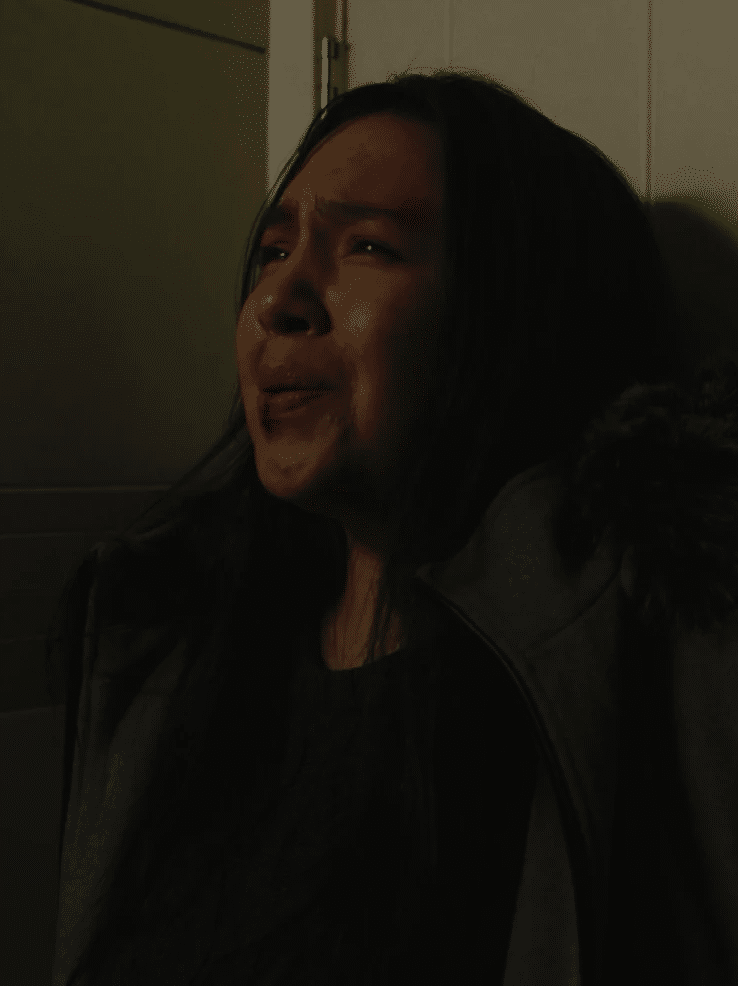
Kelly: What are you most excited about regarding the release? What impact do you anticipate this film to have?
Roseanne: “I was teasing my family, saying I wish that audiences could experience this film in 4D so they could feel how cold it was, but I wouldn’t want to put them through that either. So just do me a favor and imagine the worst cold ever while you’re watching the film! Like, Titanic cold! When you see our breath on screen, that’s not CGI; that’s real.
Also, huge shoutout to northerners in Canada, Indigenous and Settler alike, who are the real MVPs because they have known how to survive in those conditions for one hundred plus years, and in some cases thousands of years!
In terms of impact, I like to make unique and distinguishable films, and I think this is a pulpy thriller unlike any you’ve ever seen before.”
We can’t wait for the premiere!
Click here for more info on Roseanne Supernault and “Cold Road”
Click here for a list of venues and showtimes near you


